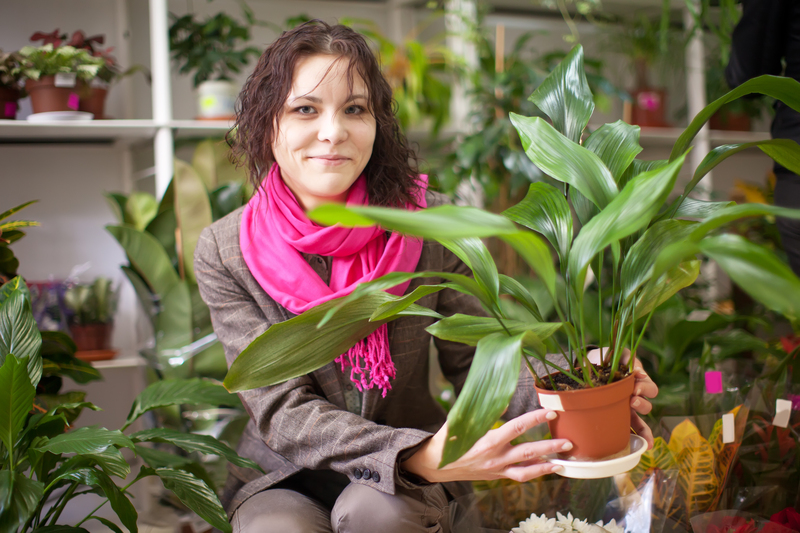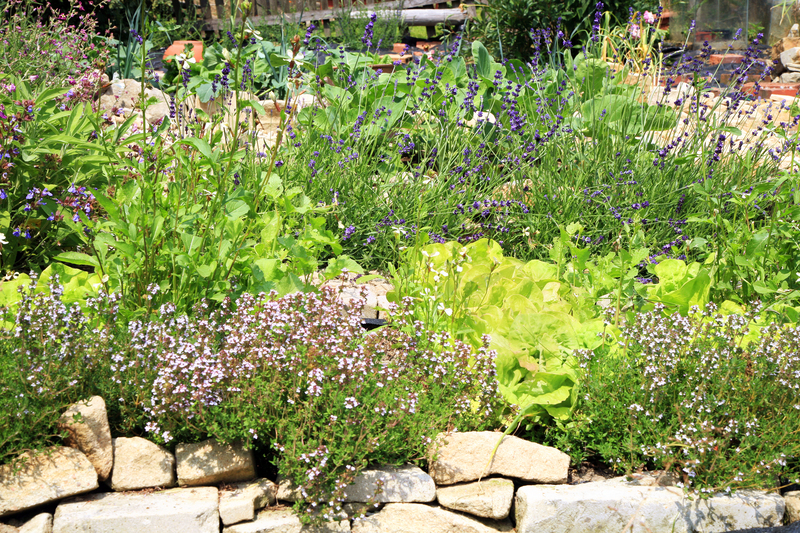Crafting Nutrient-Dense Soil from Organic Matter
Posted on 11/09/2025
Crafting Nutrient-Dense Soil from Organic Matter: The Ultimate Guide for Garden Success
Improving your garden begins with its foundation: the soil. Not just any soil, but nutrient-dense, fertile, living soil teeming with minerals and microorganisms. Building such high-quality soil doesn't require synthetic chemicals--it starts with organic matter. In this comprehensive guide, you will learn the science, techniques, and benefits of crafting nutrient-dense soil from organic matter, ensuring your plants thrive like never before.

Why is Nutrient-Dense Soil Essential?
Soil health is directly linked to plant health, which in turn impacts crop yield, disease resistance, and nutritional value. Nutrient-rich soil:
- Supports robust root development
- Promotes the growth of beneficial microorganisms
- Enhances water retention and drainage
- Reduces the need for chemical fertilizers and pesticides
- Lends itself to sustainable gardening practices
Simply put, the better your soil, the healthier your plants will be. Let's dive into the art and science of turning organic matter into a potent, nutrient-filled soil amendment.
Understanding Organic Matter and Soil Fertility
Organic matter encompasses any plant or animal material that returns to the soil and undergoes decomposition. This includes leaves, grass clippings, kitchen scraps, animal manure, and cover crops. When properly managed, organic matter becomes a rich reservoir of nutrients and a prime ingredient for building healthy soil structure.
The Role of Organic Matter in Soil Health
Organic matter is the engine of thriving soil ecosystems. It:
- Feeds soil organisms
- Improves soil structure and porosity
- Increases nutrient availability
- Buffers pH and moderates soil temperature
- Reduces soil erosion and compaction
Without organic inputs, soil quickly depletes of nutrients, resulting in weak, stunted crops.
How to Build Nutrient-Dense Soil from Organic Matter
Creating fertile soil is a journey that starts with understanding your site and gathering the right materials. Follow these actionable steps for crafting nutrient-dense soil from organic matter:
1. Analyze Your Existing Soil
Begin by testing your soil's texture, nutrient levels, and pH, either through DIY kits or professional laboratories. Identifying deficiencies will guide your amendments and ensure you're crafting soil rich in the nutrients your plants actually need.
2. Gather Quality Organic Materials
Diverse organic materials produce balanced, rich soil. Source a blend of:
- Compost: Decomposed plant and food waste
- Animal manure (preferably aged or composted)
- Green manure (cover crops like clover or vetch)
- Shredded leaves and grass clippings
- Wood chips or bark
- Straw or hay
Diversity is crucial--different materials supply different macro and micronutrients essential for truly nutrient-dense garden soil.
3. Master the Art of Composting
composting is the backbone of nutrient-dense soil creation . By managing the decomposition of organic matter, you create an amendment full of accessible nutrients and helpful microbes.
- Build a pile with alternating layers of green material (nitrogen-rich like food scraps) and brown material (carbon-rich like dried leaves)
- Maintain moisture, aiming for a consistency similar to a wrung-out sponge
- Turn the pile to aerate and speed up decomposition
- Allow it to fully mature before use; finished compost should be dark, crumbly, and earthy-smelling
Crafting highly fertile, nutrient-packed compost is the easiest way to inject vigor and life into your garden beds.
4. Mulching for Ongoing Fertility
Mulch is a protective, slow-release fertilizer. When you spread organic mulch over your soil, it:
- Regulates temperature and conserves moisture
- Suppresses weeds
- Slowly breaks down, feeding microbes and adding nutrients over time
Use straw, shredded bark, or leaf mold to feed your soil as it decomposes, year-round.
5. Use Green Manures and Cover Crops
Planting cover crops like clover, alfalfa, or rye in fallow beds:
- Boosts organic matter
- Prevents erosion
- Adds nitrogen (especially from legumes)
- Disrupts pest cycles
Mow or turn the cover crop into the soil before flowering. This organic matter decomposes rapidly, enriching your soil with nutrients and organic compounds.
Enhancing Nutrient Density: Beyond Organic Matter
While organic matter is the foundation, true nutrient density also relies on rock dusts, minerals, and biochar. Here's how to fine-tune your soil for peak fertility:
Mineral Amendments
Balanced, diverse nutrition fuels plant growth. Supplement your organic matter with:
- Rock dusts: Basalt, granite, or glacial rock dust for trace minerals
- Greensand: Adds potassium, magnesium, and iron
- Gypsum: Supplies calcium and sulfur
- Kelp meal: Infuses soil with micronutrients and plant hormones
Apply according to soil test results, mixing into beds prior to planting for best results.
Encouraging Beneficial Soil Microbial Life
Healthy, nutrient-dense soil isn't just about minerals--it's alive with billions of beneficial microbes.
- Bacteria and fungi break down organic matter, making nutrients plant-available
- Protozoa and nematodes cycle nutrients and suppress pests
Boost soil biology by:
- Adding compost teas and vermicompost
- Avoiding pesticides and excessive tillage
- Maintaining moisture and a pH around 6-7
The greater the microbial diversity, the more efficient your soil becomes at cycling organic matter into nutrients.
Maintaining Your Nutrient-Dense Soil Over Time
Once you've achieved a rich, fertile growing medium, the key is to maintain its health year after year. This involves:
- Annual or seasonal soil testing to guide amendments
- Continuous addition of organic matter: compost top-dressing, green manures, mulch
- Rotating crops to balance nutrient extraction and reduce pest pressure
- Minimizing heavy tillage to protect soil structure and microbial life
Think of nutrient-dense soil as a living investment--the more you nurture it, the more it yields over time.
Common Mistakes When Creating Nutrient-Rich Soil
Avoid the pitfalls that can compromise your efforts:
- Adding fresh manure or uncomposted materials directly to planting areas (can burn plants and introduce pathogens)
- Neglecting to test your soil regularly
- Over-relying on a single source of organic matter (e.g., only leaves or only grass clippings)
- Applying chemical fertilizers or pesticides that diminish soil biology
Remember: balance and patience are essential for truly nutrient-rich soil.
The Environmental Impact of Using Organic Matter for Soil Fertility
When you focus on crafting nutrient-dense soil from organic matter, you not only foster healthier plants, but you also:
- Reduce landfill waste by repurposing compostables
- Capture and sequester carbon, addressing climate change
- Support local biodiversity and pollinators
- Reduce runoff and pollution from synthetic inputs
Cultivating organically rich, living soil is a sustainable act that benefits your garden--and the planet.

FAQs on Building Nutrient-Dense Garden Soil
*How often should I amend my soil with organic matter?*
At least once annually, ideally by top-dressing with compost each spring or fall. Heavy feeders like vegetables may benefit from more frequent applications.
*Can I make fertile soil without composting?*
While composting is optimal, you can also use aged manure, leaf mold, and direct application of mulches--though decomposition may be slower.
*Will organic matter fix clay or sandy soils?*
Yes! Adding organic material to clay loosens compaction; in sandy soil, it helps retain moisture and nutrients. Over time, it builds a friable, balanced structure.
*What is the best organic matter for nutrient-rich soil?*
A diverse mix! Quality compost, well-rotted manure, chopped leaves, cover crops, and even seaweed provide a robust array of nutrients and beneficial compounds.
Conclusion: Let Nature Guide Your Soil Building
Crafting nutrient-dense soil from organic matter is equal parts tradition, science, and art. By mimicking natural cycles--returning organic debris to the earth--you tap into a sustainable system that produces vibrant, healthy plants and abundant harvests.
Remember:
- Test your soil and amend thoughtfully
- Utilize a diversity of organic matter sources
- Maintain robust microbial life and soil structure
- Embrace composting, mulching, and cover cropping
Healthy soil is the foundation of every successful garden. With patience and attention, your efforts in transforming organic matter into living, nutrient-dense soil will reward you season after season.
Start today--your plants and our planet will thank you!
Latest Posts
Canine Companions in the Garden: Making it Work
Revolutionize your garden to support a healthier planet
Garden Smart: Low Maintenance Strategies on a Budget

